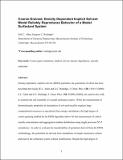Coarse-grained, density dependent implicit solvent model reliably reproduces behavior of a model surfactant system
Author(s)
Allen, Erik C.; Rutledge, Gregory C.
Downloadallen_a09020247rev_ms.pdf (778.2Kb)
OPEN_ACCESS_POLICY
Open Access Policy
Creative Commons Attribution-Noncommercial-Share Alike
Terms of use
Metadata
Show full item recordAbstract
Density dependent, implicit solvent (DDIS) potentials, the generation of which has been described previously [ E. C. Allen and G. C. Rutledge, J. Chem. Phys. 128, 154115 (2008) ; E. C. Allen and G. C. Rutledge, J. Chem. Phys. 130, 034904 (2009) ], are used in this work to examine the self-assembly of a model surfactant system. While the measurement of thermodynamic properties in simulations of solvated micelles requires large computational resources or specialized free energy calculations, the high degree of coarse-graining enabled by the DDIS algorithm allows for the measurement of critical micelle concentration and aggregation number distribution using single processor NVT simulations. In order to evaluate the transferability of potentials derived from the DDIS methodology, the potentials are derived from simulations of simple monomeric solutes and used in the surfactant system without modification. Despite the high degree of coarse graining and the simplicity of the fitting simulations, we demonstrate that the coarse-grained DDIS potentials generated by this method reliably reproduce key properties of the underlying surfactant system: the critical micelle concentration, and the average aggregation number. The success of the DDIS algorithm suggests its utility for more realistic surfactant models.
Date issued
2009-05Department
Massachusetts Institute of Technology. Department of Chemical EngineeringJournal
Journal of Chemical Physics
Publisher
American Institute of Physics
Citation
Allen, Erik C., and Gregory C. Rutledge. “Coarse-grained, density dependent implicit solvent model reliably reproduces behavior of a model surfactant system.” The Journal of Chemical Physics 130.20 (2009): 204903.
Version: Author's final manuscript
ISSN
0021-9606